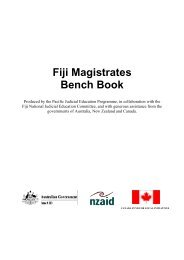Tuvalu Island Courts Bench Book - Federal Court of Australia
Tuvalu Island Courts Bench Book - Federal Court of Australia
Tuvalu Island Courts Bench Book - Federal Court of Australia
Create successful ePaper yourself
Turn your PDF publications into a flip-book with our unique Google optimized e-Paper software.
Lawful entering<br />
The accused must have entered the property for a lawful purpose.<br />
This includes being invited onto the property by the other person, or<br />
entering the property to deliver something or some other good<br />
reason.<br />
Unlawfully remaining<br />
The prosecution must prove that there was no lawful reason for<br />
remaining.<br />
If the other person asks the accused to leave and he or she does not,<br />
the accused is unlawfully remaining. If the lawful entering was<br />
something like making a delivery, as soon as that has been done, the<br />
accused should leave the property, otherwise he or she is unlawfully<br />
remaining.<br />
If the defence provides a reason for remaining, what is it, and does it<br />
have any merit?<br />
Intent to commit an <strong>of</strong>fence<br />
If this is the ground on which the charge is based, the prosecution<br />
must prove that the accused intended to commit an <strong>of</strong>fence. This is<br />
a subjective test – it is the accused’s intention that is important. You<br />
may have to infer this from the circumstances.<br />
Under this ground, the prosecution does not have to prove that the<br />
accused actually committed an <strong>of</strong>fence – intention to do so is<br />
enough.<br />
Intention to intimidate, insult or annoy<br />
If this is the ground on which the charge is based, the prosecution<br />
must prove that the accused intended to intimidate, assault or annoy<br />
the other person. This is a subjective test – it is the accused’s<br />
intention that is important. You may have to infer this from the<br />
circumstances.<br />
Under this ground, the prosecution does not have to prove that the<br />
accused actually intimidated, insulted or annoyed the other person –<br />
intention to do so is enough.<br />
Charges under s182(1)(c)<br />
Property<br />
Property includes a building, vessel or land.<br />
Possession<br />
This will include ownership and lease and any other kind <strong>of</strong><br />
<strong>Tuvalu</strong> <strong>Island</strong> <strong><strong>Court</strong>s</strong> <strong>Bench</strong> <strong>Book</strong> June 2004
















